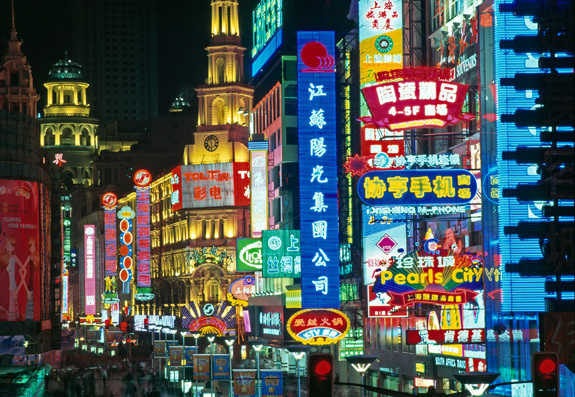
"The scale and configuration is matchless in Asia. It is close to America's Metropolitan Museum of Art, France's Musee d'Orsay and other internationally famous art museums," Shanghai culture chief Hu Jinjun said before the opening.
The government-backed museum has an exhibition space alone of 64,000 square metres (688,890 square feet), Hu told state media.
A new contemporary art museum also welcomed holiday crowds on Monday to exhibit works from the 1980s onwards and give a permanent home to Shanghai's annual art festival.
Called the "Power Station of Art", the 40,000-square-metre (430,556 square feet) museum takes its name from the former power station building which was converted for the Expo.
Critics have raised questions over how Shanghai will fill the massive spaces with meaningful exhibitions.
"They're basically modelling themselves on New York or London," said Chris Gill, a Shanghai-based artist and arts writer.
"China tends to build these huge art museums. The problem is what they're going to put in it. The content side is always compromised by the political situation," he told AFP.
China censors art that it considers politically sensitive or pornographic, with local officials having the right to pull individual works or shut down shows.
Shanghai officials in September barred display of a photo work by artist Chi Peng, which shows a gorilla at Beijing's famed Tiananmen Square, according to his microblog.
In 2006, Shanghai shut down an exhibition by dozens of Chinese artists at a private art museum for showing "pornographic" images, described as pictures of naked women.
The exhibitions in place for the opening of the China Art Museum are heavily weighted towards Chinese art, but one floor has foreign works including a painting by Rembrandt and another by Johannes Vermeer -- on loan from the Netherlands' Rijksmuseum.
Shanghai university student Wang Qingyong marvelled at the size of the new museum.
"There is a lot of space. More works will come," she said gazing at a painting by the American artist Robert Bechtle.
Shanghai has already tested the China Pavilion as a venue for art, spending $1.4 million for China's biggest ever exhibition of the works of Spanish artist Pablo Picasso last year, but attendance was lower than expected.
The city has high hopes for attendance, distributing free tickets for 10,000 people a day to the China Art Museum and 6,000 daily for the Power Station of Art over the week-long National Day holiday, which started Monday.
---------------------------------------------------------------------------------------
The government-backed museum has an exhibition space alone of 64,000 square metres (688,890 square feet), Hu told state media.
A new contemporary art museum also welcomed holiday crowds on Monday to exhibit works from the 1980s onwards and give a permanent home to Shanghai's annual art festival.
Called the "Power Station of Art", the 40,000-square-metre (430,556 square feet) museum takes its name from the former power station building which was converted for the Expo.
Critics have raised questions over how Shanghai will fill the massive spaces with meaningful exhibitions.
"They're basically modelling themselves on New York or London," said Chris Gill, a Shanghai-based artist and arts writer.
"China tends to build these huge art museums. The problem is what they're going to put in it. The content side is always compromised by the political situation," he told AFP.
China censors art that it considers politically sensitive or pornographic, with local officials having the right to pull individual works or shut down shows.
Shanghai officials in September barred display of a photo work by artist Chi Peng, which shows a gorilla at Beijing's famed Tiananmen Square, according to his microblog.
In 2006, Shanghai shut down an exhibition by dozens of Chinese artists at a private art museum for showing "pornographic" images, described as pictures of naked women.
The exhibitions in place for the opening of the China Art Museum are heavily weighted towards Chinese art, but one floor has foreign works including a painting by Rembrandt and another by Johannes Vermeer -- on loan from the Netherlands' Rijksmuseum.
Shanghai university student Wang Qingyong marvelled at the size of the new museum.
"There is a lot of space. More works will come," she said gazing at a painting by the American artist Robert Bechtle.
Shanghai has already tested the China Pavilion as a venue for art, spending $1.4 million for China's biggest ever exhibition of the works of Spanish artist Pablo Picasso last year, but attendance was lower than expected.
The city has high hopes for attendance, distributing free tickets for 10,000 people a day to the China Art Museum and 6,000 daily for the Power Station of Art over the week-long National Day holiday, which started Monday.
---------------------------------------------------------------------------------------









 Home
Home Politics
Politics









